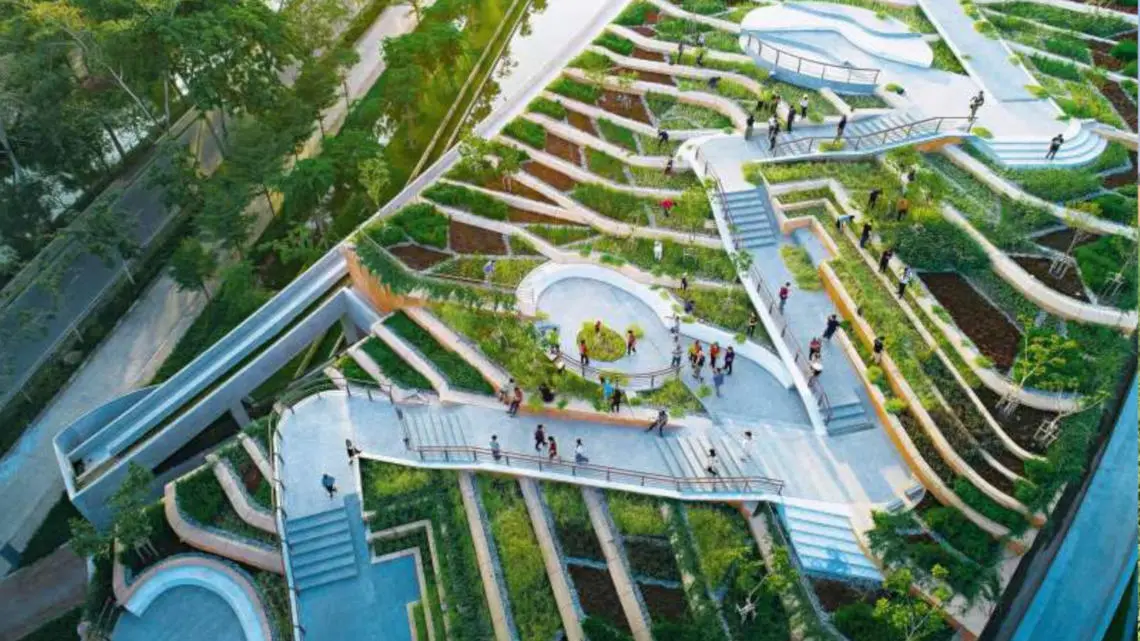Authors
WBCSD Communications
- First in construction sector to commit to measurable positive impact on biodiversity with transformative rehabilitation plans
- Industry-leading commitment to replenish freshwater in water-risk areas by 2030 and targets to lower water intensity across all product lines
- Driving nature-based approach in products and solutions to bring nature into cities
Holcim announces its strategy to become nature-positive by restoring and preserving biodiversity and water while bringing more nature into cities. Holcim’s positive impact on biodiversity is based on transformative rehabilitation plans and measured by a science-based methodology developed in partnership with the International Union for Conservation of Nature (IUCN). Preserving water across its business, Holcim targets to replenish freshwater in water-risk areas while lowering water intensity across all its product lines. Holcim will also accelerate the deployment of solutions such as Hydromedia and green roof systems for more liveable urban environments. Holcim’s nature-positive strategy places it among the 1% of the 500 largest global companies1 with science-driven biodiversity targets and the first in its sector with a freshwater replenishment commitment.
Magali Anderson, Chief Sustainability and Innovation Officer, Holcim: “With nature at the heart of everything we do, I am pleased that we are taking significant steps to improve our biodiversity and water stewardship in a measurable and science-driven way. Building on our net zero commitment, our nature-based solutions play a vital role in reducing the impact of climate change and increasing our business’ resilience. Becoming nature-positive plays a critical role in our vision to build progress for people and the planet.”
Eva Zabey, Executive Director, Business for Nature: “We congratulate Holcim for its ambitious biodiversity and water goals as part of its nature-positive journey. Implementing Holcim’s nature strategy can drive scalable change both within the building materials sector and industry as a whole. We need all businesses to rapidly step up their actions and commitments to protect and restore the ecosystems on which we all rely to create healthy and resilient societies.”
On its journey to become nature-positive, Holcim commits to:
- Delivering a measurable positive impact on biodiversity by 2030 based on the Biodiversity Indicator Reporting System (BIRS) developed in partnership with IUCN, with:
- Global BIRS baseline completed in all managed land by 2024
- All quarries with rehabilitation plans by 2022
- Replenishing freshwater in water-risk areas by 2030, with:
- 75% of sites to be water-positive
- 100% of sites to be equipped with water recycling systems
- Lowering water intensity across business lines2 by 2030, with:
- 33% reduction in Cement
- 20% reduction in Aggregates
- 15% reduction in Ready-Mix Concrete
Holcim will continue to develop and deploy its nature-based approach across its products and solutions. For instance, its bioactive concrete restores marine ecosystems, its Firestone roofing systems contain the urban heat island effect and its Hydromedia permeable concrete recharges groundwater, allowing urban forests to grow. Scaling up its impact across its supply chain, Holcim ensures that all its environmentally critical suppliers operate according to recognized environmental management systems.
For more information on Holcim’s nature-positive strategy, visit https://www.holcim.com/nature.
1Review of the top 500 companies of the Forbes Global 2000.
2Compared to 2018 baseline, 2030 targets equal to 211 liters/ton of cement, 179 liters/ton of aggregates and 219 liters/m3 of
ready-mix concrete.

